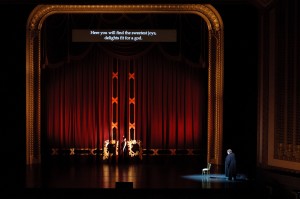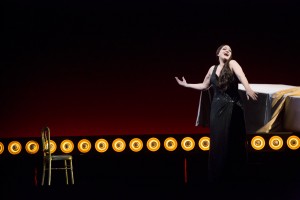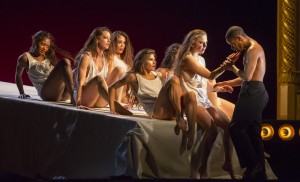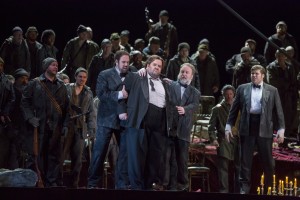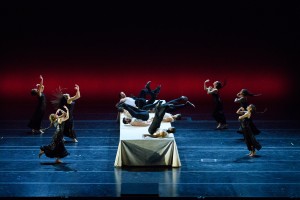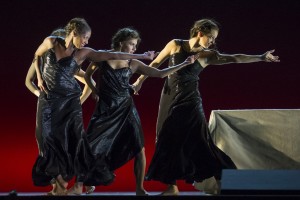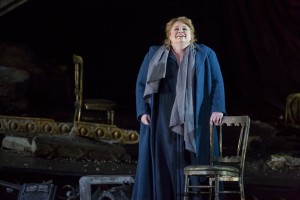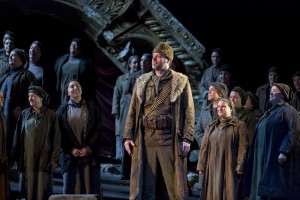IN TERMS OF SIMILARLY SHODDY DIRECTION, TANNHÄUSER TIES TOSCA
From the highpoint of Mozart’s Don Giovanni, Lyric Opera’s 60th anniversary season has been on a slow downward arc. That inexorable decline reaches new depths of mediocrity in Tannhäuser–despite Wagner’s sublime music and timeless theme. Indeed, that music features gorgeous harp accompaniments, martial brass scorings, magnificent choruses, and songs of immense tenderness and passion. Sir Andrew Davis conducts it all admirably, proving that he is one of the great Wagner interpreters of our age.
The opera’s illustration of the redeeming power of pure love, as opposed to profane love (or lust), unfolds rather bizarrely in this production, which first appeared in Covent Garden. British director Tim Albery inexplicably sets Tannhäuser during a war-weary decade of the early to mid-twentieth century, as director John Caird similarly set the production of Puccini’s Tosca that opened in January.
Set designer Michael Levine renders the sensual underworld of Venusberg as a descending cabaret stage replete with velvet curtains and bright lights in Act One. The Wartburg castle of Act Two, however, appears to be a bomb-destroyed version of the earlier cabaret. Its ornately-carved proscenium has collapsed in fragments around the down-sloping stage. What we’re supposed to make of this contrast is unclear, as is the fact that those ruins appear again, albeit somewhat diminished in Act Three’s “Valley Near the Wartburg.”
The ruined Wartburg certainly suggests war as does the muted grays and blues of the military and proletarian garb worn by the pilgrims and singing contest attendees. Jon Morrell’s uninspired costume designs change not a bit between the various settings of the three acts. Johan Botha as Tannhäuser wears the same tuxedo throughout, even on pilgrimage. Morrell strangely clothes Amber Wagner’s Elisabeth in a long coat and scarf that she clearly doesn’t need (too warm?), for she’s always taking it off and discarding it somewhere on stage.
Albery’s direction is baffling in countless other ways. He has Tannhäuser give Elisabeth a single white(!) rose as a token of his love. Why not a large red bouquet that would appear significant even in the vast interior of the Civic Opera House? Then, during the singing contest, when Elisabeth stands up and struts across the stage in outrage over Tannhäuser’s defiling of her love in Venusberg, Tannhäuser sits in her chair adding insult to injury.
And if that wasn’t enough, Botha delivers his anguished response claiming to be the most wretched man while still seated. He might have at least stood up in earnestness or dropped to his knees in penitence. Instead, Botha’s stodgy and immobile performance throughout proves that he cannot act. His voice, fortunately, almost makes up for this lack. A tenor of prodigious power and range, Botha sings nimbly and with extraordinary clarity and sensitivity.
Although Amber Wagner and Michaela Schuster (as Venus) both put in credible performances as Tannhäuser’s competing love interests, it is Gerald Finley as Wolfram who embodies his role best. His tender devotion to Elisabeth and piteous compassion for Tannhäuser find emotive expression in both gesture and voice. Yet, it is Finley’s lyrical and moving “Song to the Evening Star” that ultimately gains him the audience’s rapt attention. As Tannhäuser finally comes to a close nearly four and a half hours after it began, one is left lamenting the way Wagner’s beautifully-performed music has been so ill-served by poor staging and direction in this unsatisfying production.
photos by Todd Rosenberg
Tannhäuser
Lyric Opera of Chicago
Civic Opera House, 20 N. Wacker Drive
scheduled to end on March 6, 2015
for tickets, call 312.827.5600 or visit Lyric Opera
for more shows, visit Theatre in Chicago
